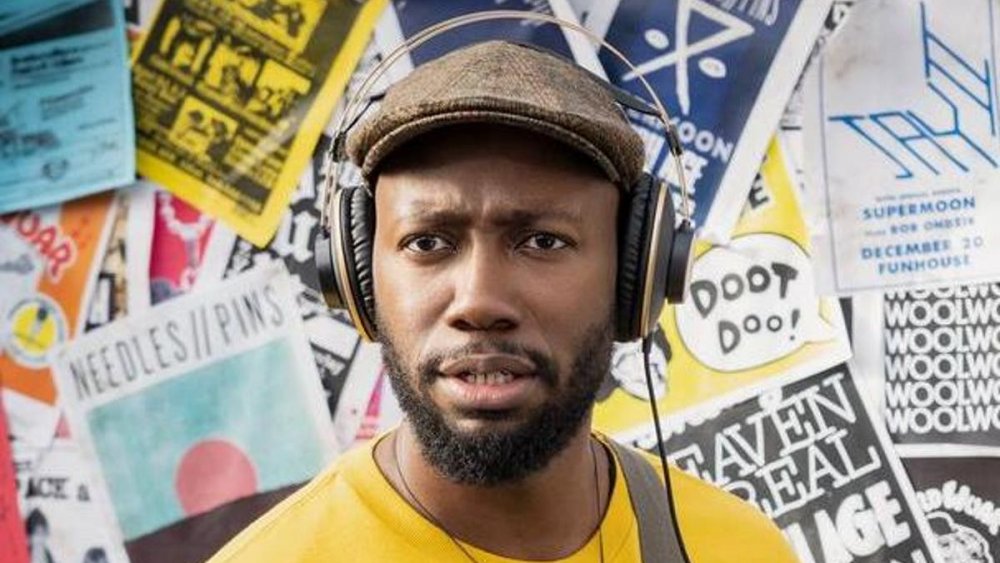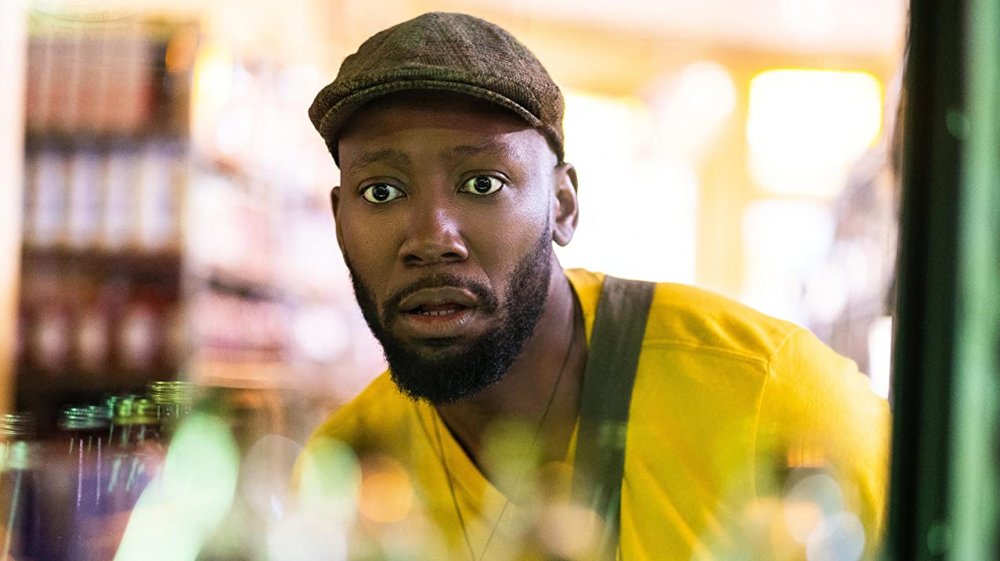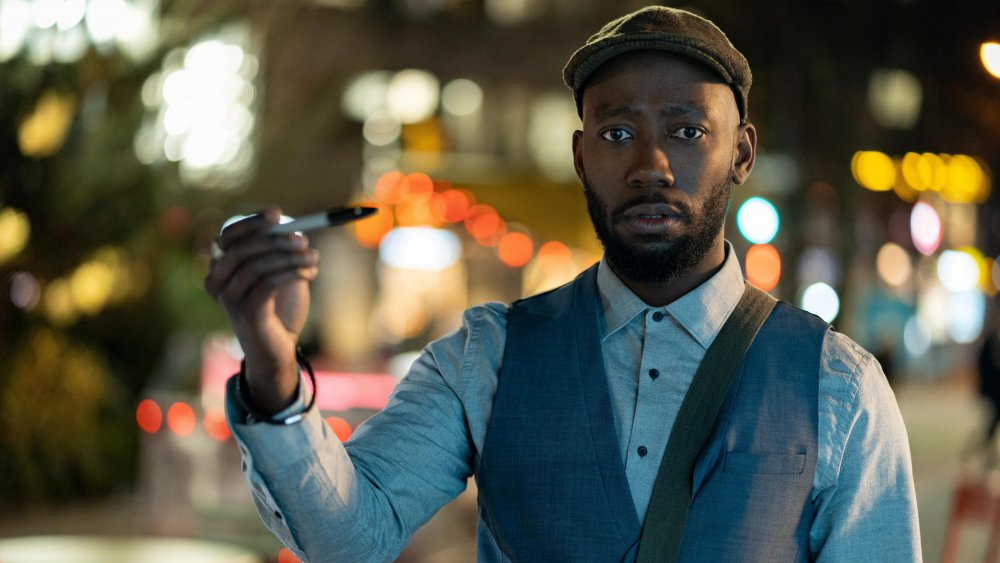How Lamorne Morris Got Into Character For Woke - Exclusive
The new Hulu series Woke is about a lot of things: police brutality, racial profiling, getting canceled, being a cartoonist ... yes, it's about being a cartoonist. In fact, Woke is at least somewhat based on the life of the very real cartoonist Keith Knight. Knight's comic strip The K Chronicles launched back in the 1990s, and has been a published by outlets like Daily Kos and the San Francisco Examiner. It, too, deals with many things — including family life and issues of race and politics.
The first season of Woke tackles a very specific issue, however: being racially profiled by the police and experiencing post-traumatic stress as a result. On Woke, New Girl actor Lamorne Morris portrays a fictionalized version of Knight known as Keef, who finds his life turned upside down after being the victim of police brutality.
Part of Keef's post-traumatic stress takes the form of him struggling with telling stories that "keep it light," which is something he once prided himself on, and part of it sees him experiencing pens, garbage cans, and other inanimate objects talking to him. No longer able to avoid the things he tried hard to steer clear of, Keef must adjust to being "woke."
Looper recently sat down with Morris to discuss how he stepped into the role of a real-life person, and how he navigated some of the issues with which Woke deals.
How Lamorne Morris and Keith Knight found Woke's Keef Knight
The real Keith Knight is a vibrant, imaginative creator to this day – and he's one of the creators of Woke. (Knight co-created the series alongside Marshall Todd.) For Morris, the fact that he was stepping into the role of a person who's still alive and who's still creating made all the difference.
"It was an interesting process because usually when you see these things, when people play a character based on a real person, they usually have passed away, or they're much, much older in their lives," Morris told Looper. "You don't really get to pull from them as much. I got lucky in that Keith's story is still being written, which is great for a series because this story can keep and continue to be written."
As Morris further shared, he and Knight spoke about "political views" and how Knight feels about police brutality, gentrification, and racism in the workplace. But Morris isn't trying to do an impersonation of Knight on Woke.
"The director, [Maurice] Marable, who's a genius, was essentially saying, 'I don't want you to do a direct impression of Keith, more so embody his essence,'" explained Morris. "'I want this show to be about him and about his journey, hence him writing it and creating it, but more so we want you to embody that spirit of him. And put your own spin on it and your own twist on it.'"
How does Keef handle being woke?
A big part of Keef's journey as a character on the first season of Woke is all about how being "woke" changes him. Being aware of the harsh realities of life is never easy, and it's uniquely harrowing to try to be a socially conscious content creator: When you try make a difference or attempt to find an artistic way to speak about injustices, there's a chance you might get it wrong. Keef goes from a cartoonist who tries to tell only lighthearted stories through his comics to someone who can no longer sit idly by. So, how does Morris think Keef handles being woke?
"If you were put into a situation where you had to choose career over courage, and career over the plight of a group of people, it's really difficult because on one hand you want to be successful," said Morris. "You want to make money, you worked your whole life to achieving a goal. Are you going to throw it away for standing up for something? That's the dilemma that a lot of us have, especially as artists. Keef is just navigating it in a very human way, where he's asking questions, he's testing the waters, he's doing trial and error. He's putting out certain pieces of art that might ruffle some feathers."
Ruffling feathers is a thing viewers see Keef do very early on in Woke. Not only does he have to deal with the consequences of a corporate entity not approving of his new social message, but he also steps in it with those same people with whom he's hoping to ally.
"He's getting canceled, uncanceled — all these things that are happening to him is what would happen to an actual person going through that journey," noted Morris.
How does Lamorne Morris handle being on Woke?
Woke is more than just about the impact of racial injustice on the real-life Keith Knight — it's also about racial injustice in general. For Morris, it's personal, too.
"I mirror [Keith's] journey in a way where when I was growing up, I just wanted to be an actor. I was always just studying to do this," the actor said. "And then you start seeing things around you and you don't really want to speak on them. You're like, 'If I say this on Twitter, I wonder if this network will agree with me or disagree. I wonder if these directors or these brands will stop messing with me. Maybe they'll stop dealing with me.'"
Morris certainly has had to navigate both sides of the coin. Not long before he was the star of Woke, he played Winston Bishop, an eccentric and kind-hearted guy who ultimately becomes a Los Angeles police officer, on the NBC series New Girl. But Morris said he pushes past the anxiety, telling Looper, "At some point you have to just say, 'You know what? If a brand, or a network, or a director, or a producer doesn't want to work with you based on your beliefs or your convictions, then you don't want to work with them anyway.'"
Morris feels particular confidence working on Woke, saying that "the whole world is in on this." He shared, "You see people in France marching for what's happening in America. And you see people in the UK, you see people in London holding up signs and shouting in the streets, screaming George Floyd's name. So people who are afraid to speak up should know that you shouldn't be at this moment because this is an all-hands-on-deck thing, and the cat's out of the bag."
Woke is available to stream on Hulu now.



